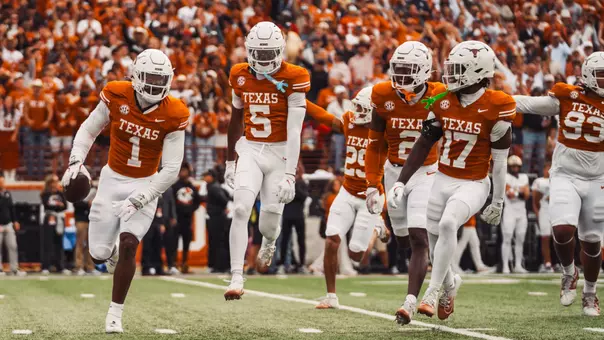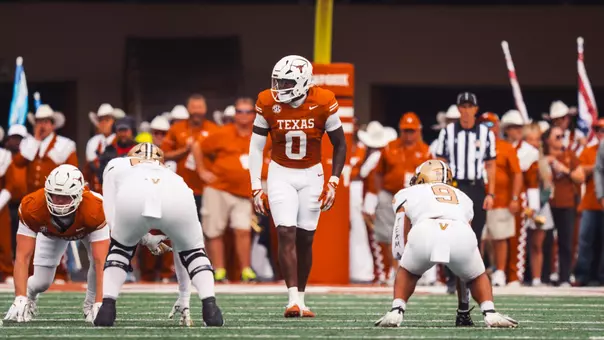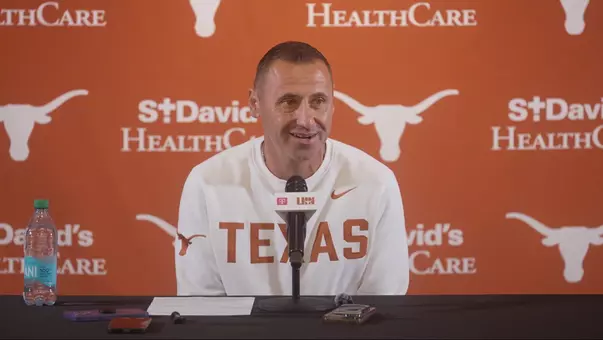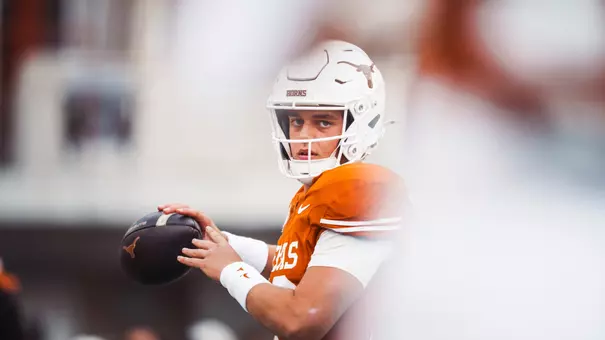The University of Texas at Austin Athletics
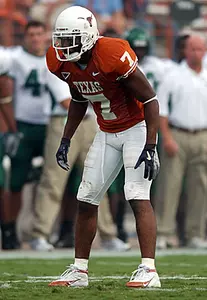
Michael Huff: Mind over matter
08.30.2005 | Football
Players entering college who have clocked 10.1 in the 100 meters usually play on the outside as a wide receiver or cornerback. That is what senior Michael Huff expected to do when he arrived at Texas from Irving's Nimitz High School.
After redshirting his freshman season, it became apparent to the coaching staff that Huff's track speed wasn't necessarily his most important attribute. It was his knowledge of the game. With other talented players around, the Texas defensive staff made a decision that would not only impact the defense, but would help define Huff's college career. He would play safety.
"I've had a lot of players who could physically play corner, but mentally couldn't, or could physically play safety, but mentally couldn't," explained Texas co-defensive coordinator and secondary coach Duane Akina. "He is one of those special players that can play both positions."
Traditionally, and specifically as of late, Texas has been deep at the corner and Akina's philosophy is simple: Play the best players. So, with four and sometimes five cornerbacks who Akina felt deserved to play, he needed one of them with the physical tools and a superior understanding of football and defense to move to the safety position, which is where Michael Huff's saga began.
"At first, when I got here, I was just excited to get on the field," explained Huff, who garnered honorable mention All-America honors for his work in 2004. "I had a chance to move back to corner after (Nathan) Vasher left, but coach Akina and I decided that in order to get some of the other guys on the field, it was best if I stayed at the safety position."
Playing cornerback is more of a natural position for athletes, but a switch to safety gets that player more involved in the run versus pass game, which according to coach Akina is a very difficult adjustment. That is where Huff's intuition comes in. His feel for the game made him the candidate for the switch to safety and his colleagues in the secondary can see it as well.
"He is capable of reading things quicker than some of the other guys in the secondary," explained Cedric Griffin, who came in with Huff and also redshirted during the 2001 season. "He learns a little faster than the rest of us and has the ability to understand some of the concepts a little better."
But it wasn't always like that for Huff. He came to Texas knowing that he wasn't ready to play on this level. He entered college as a track star playing football, but he used his redshirt year to learn how to play in the secondary, how to break down film and how to diagnose different plays, but the most important thing in his mind was confidence.
"Even the best players get beat," explained Huff. "(Quentin) Jammer even got beat every once in a while and he was the sixth pick in the draft, but he showed me it is important to bounce back and be ready for the next play."
It was also during that time that Huff refined his feel for the game. It was something that was always there, but his work with coach Akina helped him understand more and more what offenses were trying to do and what he and the rest of the defense needed to do to stop them.
"He's our quarterback in the secondary," explained Akina. "He makes all of the calls back there and with his ability to diagnose, he can make us better on the fly. He is one of those guys I really trust."
That trust has allowed Huff to suggest things to Akina throughout the course of a game and because of all the time they have put in together over the past five seasons, Akina is willing to go with it a lot of the time. The trust is also there with the rest of the guys on defense.
"He knows exactly what he's doing, what the cornerbacks are doing, what I'm doing," explained preseason All-Big 12 middle linebacker Aaron Harris. "He's really got it down. I don't think there is anyone else in the country that could help us more at that position than him."
The film study got him to a point where he understood the entire defense's goals, but it also fostered his intuition. Huff has a difficult time explaining exactly where that intuition comes from; he just knows it's there.
"I don't really know how to explain it," said Huff. "I kind of know what the other guys are trying to do before they do it. I guess it is a certain awareness that helps me be in the right place at the right time."
He's been in that right place on at least four occasions. That is the number of interceptions he has returned for touchdowns during his career, leaving him one shy of tying the NCAA's all-time mark. He was also in the right place on at least 73 other occasions in 2004, finishing third on the team in tackles.
"Knowing what everyone on the field is supposed to be doing, both offensively and defensively, makes you a better player," says Huff.
All the physical skills in the world can make you a decent player, but it is that philosophy that is going to gets Huff over the top. That is why he is on many of the preseason All-America lists and why NFL scouts have already and will continue to take notice.
At this point, it doesn't matter whether he is listed as a cornerback or a safety; he is now known as just one thing, a football player.


